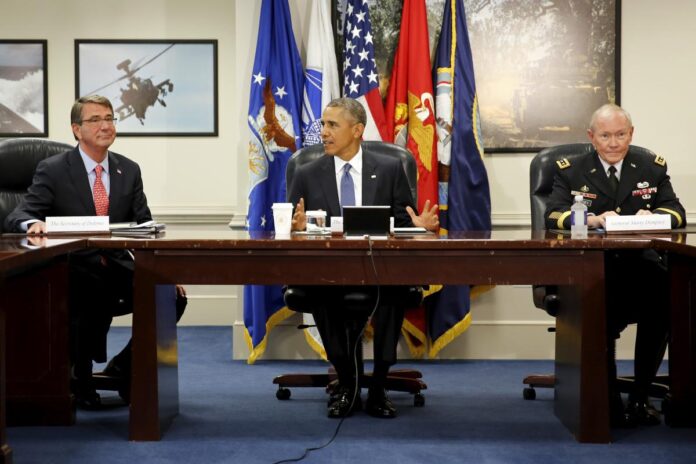Author: Emma Ashford
Affiliation: Cato Institute
Organization/Publisher: Foreign Affairs
Date/Place: May 29, 2020/USA
Type of Literature: Journal Article
Word Count: 2275
Link:https://www.foreignaffairs.com/articles/2020-05-28/build-better-blob
Keywords: The Blob, Elites, liberal Hegemony, Realism, Trumpism, and The US Foreign Policy
Brief:
The author presents here some critique and evaluation of the last article published by Hal Brands, Peter Feaver, and William Inboden in Foreign Affairs, in which they advocated for the Blob, (i.e. the US Foreign Policy Establishment, I have previously provided here a brief on it). They concluded that the “Blob” was and still the solution, not the problem, especially after the Trumpian approach showed disastrous results in the US foreign policy given to the neglect of the Blob’s experts, while they defended the “liberal hegemony” approach to the extent that it became synonymous with the elites who dominate the decisions of the US foreign policy establishment, its strategic vision, and ideological orientation as well. Ashford tries here to emphasize that rejecting the Trumpian approach does not necessarily mean surrendering to the perceptions of the liberal hegemony elites who dominate the US foreign establishment or give them a blank check without any accountability. As the criticism of some Realist scholars, such as Stephen Walt, to the Blob’s elites and their approach, Ashford sees that the US Foreign establishment represents in its largest part a narrow group of elites who expressing specific views regarding the US global role and marginalizing others’ approaches. The Blob’s defenders, such as Brands, paint a very rosy picture regarding the past few decades of US foreign policy to the point that serious and costly decisions such as the invasion of Iraq are “merely mistakes” that must be learned from, rather than as crimes that have led to catastrophic consequences like disturbing the balance of power in the Middle East causing the rise of ISIS and harms the US interests and image across the world. On the other hand, the author criticizes the calls for the United States to abandon any leadership role globally, it is perfectly acceptable to argue, for example, that the expansion of NATO to the east was a mistake, but “it is anathema to suggest that NATO itself may no longer serve American interests, given that Washington bears an unequal defense burden” compared to other allies. Moreover, the author believes that Brands and his colleagues also present a false picture when they argue that: 1. The liberal internationalism which has emerged since the end of the Cold War is an extension of the same approach pursued by Washington since the end of World War II. 2. Washington’s extensive engagement in global affairs after the Cold War has produced global stability and prosperity. 3. The chaos sweeping the world today is only a result of Trump’s abandonment of their approach (liberal hegemony), as Ashford considers that the bipartisan consensus on foreign policy that emerged by the end of the twentieth century was not merely a continuation of the United States’ successful Cold War strategy, as the power and strategy have been used by Washington during and after the Cold War were not entirely similar. Washington has used its unchallenged power since the “unipolar moment” to launch foreign military campaigns from dual containment in the Middle East to humanitarian interventions in the Balkans and Central Asia to the lead of a global campaign against terrorism, as well as its insistence on “social engineering” through the principle of “democracy promotion” as well it did for many years in the Middle East or Eastern Europe (color revolutions). This policy caused some confrontations with other powers, such as Russia and Iran, wasted much of the country’s military and political precedence and made the world less stable and secure, as the number of global conflicts reached its peak today since 1975, and Freedom House’s recently released report concluded that 2019 marked “the 14th consecutive year of deterioration in political rights and civil liberties.” There is no doubt that American violations of human rights since 1991 have contributed a lot to these outcomes. Therefore, the project of liberal internationalism is a failed project, and US foreign policy today is much worse than it was at the end of 1991, as the author argues. Of course, Ashford does not see the necessity of a fully US disengaging from the world and withdrawing from its issues, this is “laughable”. There are now about 80,000 American soldiers in the Middle East compared to 20,000 who were there in the mid-1990s, and 230,000 American soldiers abroad compared to 300,000 during the last year of the Cold War, today American troops are engaged in combat in at least 14 countries, and the country’s defense spending represented about 3.4% of GDP in 2019. Therefore, a sudden American withdrawal could worsen the turmoil around the world. Finally, the author explains that the criticisms against the US foreign policy establishment are not demanding the exclusion of experts or giving the floor to amateurs and improvisation as the Blob’s defenders claim, but they are mostly criticisms of the ideology adopted by these elites (the ideology of hawkish liberal hegemony) who works to impose as the most appropriate approach for a successful US policy. She also mentions the emergence of a new young generation who are strongly engaging in discussions on the US foreign policy and national security issues and witnessed the US failures since the end of the Cold War. “They see a place for the United States in the world that is more cooperative, multifaceted, and less focused on military intervention”, as Ashford said.
By: Djallel Khechib, CIGA Senior Research Associate




